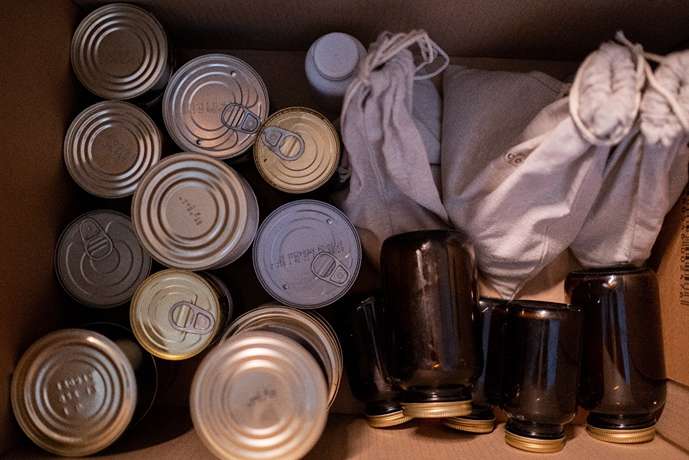
Preservation and Spoilage of Canned Foods: Understanding the Basics
Discover the secrets to preserving canned foods and avoiding spoilage with our comprehensive guide on the Preservation and Spoilage of Canned Foods.
Canned foods have been around for centuries, offering consumers a convenient and long-lasting way to store and preserve food. Despite their long shelf life, however, canned foods can still go bad if they are not stored or handled properly. Understanding the basics of preservation and spoilage of canned foods is essential to ensuring that you get the most out of your food, while also avoiding any potential health risks associated with consuming spoiled or contaminated food.
The Science Behind Preservation and Spoilage of Canned Foods
Understanding Canning Process
Canning is a method of preserving food by sealing it in an airtight container. This process effectively removes the air and bacteria that can cause food to spoil, extending its shelf life and allowing it to be stored for months or even years. The process of canning involves heating the food to a high temperature, which kills off any bacteria, yeast, and mold that may be present.
Factors that Influence Spoilage of Canned Foods
Despite the canning process, there are still several factors that can influence the spoilage of canned foods. These include:
- Incorrect storage temperatures
- Improper can sealing
- Exposure to light and heat
- Contamination from outside sources
- It's important to be aware of these factors and take steps to minimize their impact on your canned food.
How to Prevent Spoilage of Canned Foods
1. Proper Storage of Canned Foods
Storing canned foods at the correct temperature is key to preventing spoilage. Canned foods should be stored in a cool, dry place, away from direct light and heat sources. This will help to preserve the quality of the food and prevent the growth of any bacteria or mold that may cause spoilage.
2. Checking Can Seals
Before using any canned food, it's important to check the can seal to ensure that it's still intact. If the can is damaged or the seal is broken, the food inside may have been contaminated and should not be consumed.
3. Rotating Stock
Rotating your canned food stock is another important step in preventing spoilage. This means moving older cans to the front of your pantry or storage area and putting newer cans in the back. This will help you to use the oldest cans first, reducing the risk of spoilage and waste.
Canned Foods Types
There are several types of canned foods, including:
- Vegetables: corn, green beans, peas, carrots, etc.
- Fruits: peaches, pineapples, pears, etc.
- Meat: chicken, tuna, salmon, ham, etc.
- Soups: tomato, chicken noodle, vegetable, etc.
- Sauces: tomato sauce, BBQ sauce, spaghetti sauce, etc.
- Condiments: pickles, olives, peppers, etc.
- Beverages: fruit juices, soda, etc.
- Seafood: shrimp, clams, crab meat, etc.
These are some of the most common canned food types, but there are many other options available as well.
Importance of Canned Foods
Canned foods are important for several reasons, including:
- Convenience: Canned foods are quick and easy to prepare, making them a convenient option for busy individuals or families.
- Long shelf life: Canned foods have a long shelf life, which makes them a great option for emergency preparedness or for those who want to stock up on non-perishable items.
- Affordable: Canned foods are often less expensive than fresh or frozen alternatives, making them accessible to a wider range of people.
- Nutritional value: Many canned foods, such as fruits and vegetables, retain their nutritional value after being canned.
- Availability: Canned foods are widely available in most grocery stores, making them easily accessible to people in many different regions and countries.
- Versatility: Canned foods can be used in a variety of recipes and can be incorporated into many different types of meals.
Overall, canned foods are a practical and cost-effective option that provides convenience, nutrition, and variety to people's diets.
Advantages of Canned Food
There are several advantages to using canned foods, including:
- Convenience: Canned foods are easy to store and require minimal preparation, making them a convenient option for busy individuals or families.
- Long shelf life: Canned foods have a longer shelf life compared to fresh foods, which helps reduce food waste and makes them a great option for emergency preparedness.
- Cost-effective: Canned foods are often less expensive than fresh or frozen alternatives, making them a budget-friendly option.
- Nutritional value: Many canned foods, such as fruits and vegetables, retain their nutritional value after being canned.
- Wide availability: Canned foods are widely available in most grocery stores, making them easily accessible to people in many different regions and countries.
- Versatility: Canned foods can be used in a variety of recipes and can be incorporated into many different types of meals.
Overall, the benefits of using canned foods include convenience, long shelf life, affordability, nutritional value, and versatility.
Common Questions About Preservation and Spoilage of Canned Foods
Can I freeze canned foods?
Canned foods can be frozen, but this is not recommended as it can cause the can to expand and potentially damage the seal. If you need to freeze canned food, it's best to transfer it to a freezer-safe container first.
How long can canned foods be stored?
The shelf life of canned foods can vary, depending on the type of food and the conditions under which it is stored. On average, canned foods can be stored for 2-5 years, but this can vary greatly depending on the conditions and the specific food in question.
What are the signs of spoiled canned food?
Spoiled canned food can often be identified by a bulging can, a broken seal, or a rancid or off odor. If you suspect that a can of food is spoiled, it's best to err on the side of caution and not consume it.

Comments (0)